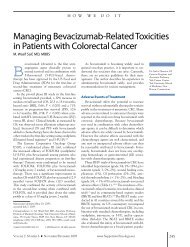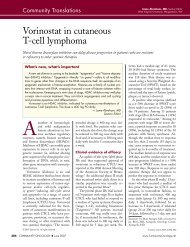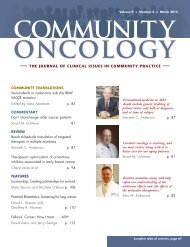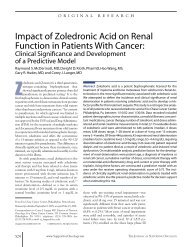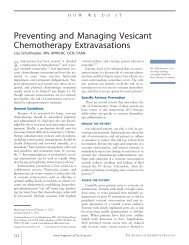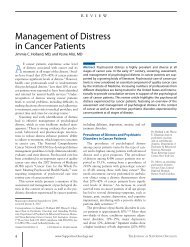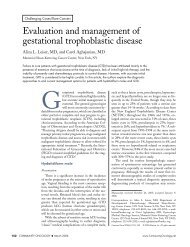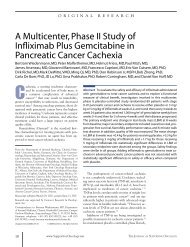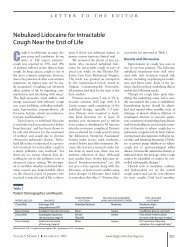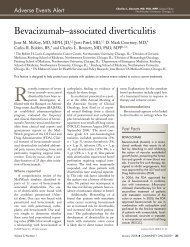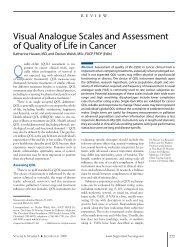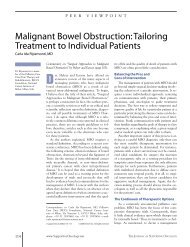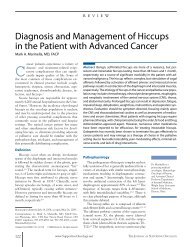Diagnosis and Management of Oral Mucositis
Diagnosis and Management of Oral Mucositis
Diagnosis and Management of Oral Mucositis
Create successful ePaper yourself
Turn your PDF publications into a flip-book with our unique Google optimized e-Paper software.
Patients (%) with WHO ≥ grade 2<br />
oral mucositis<br />
Figure 4<br />
50<br />
40<br />
30<br />
20<br />
10<br />
0<br />
Cycle 1<br />
∆ 11.0%<br />
P = 0.026<br />
Placebo<br />
AES-14<br />
Cycle 2<br />
∆ 17.8%<br />
P = 0.027<br />
Carryover Effect <strong>of</strong> Saforis in Phase III Trial <strong>of</strong> Patients<br />
With Breast Cancer Treated With Chemotherapy<br />
The 326 women who developed oral mucositis (grade ≥ 2) due to chemotherapy were<br />
r<strong>and</strong>omized to receive treatment with Saforis (2.5 g three times daily) or placebo for 14<br />
days. Saforis significantly reduced the incidence <strong>of</strong> oral mucositis compared with placebo<br />
in cycle 1. Patients who crossed over from Saforis to placebo in cycle 2 experienced a further<br />
reduction in the risk <strong>of</strong> mucositis compared, suggesting a carryover effect.<br />
Adapted from Peterson et al 47<br />
<strong>Diagnosis</strong> <strong>and</strong><br />
<strong>Management</strong> <strong>of</strong><br />
<strong>Oral</strong> <strong>Mucositis</strong><br />
tion <strong>of</strong> oral mucositis, with less need for parenteral<br />
morphine for pain relief.<br />
These results led to a placebo-controlled,<br />
crossover phase III trial that evaluated the ability<br />
<strong>of</strong> Saforis to reduce the incidence <strong>and</strong> severity <strong>of</strong><br />
oral mucositis in breast cancer patients receiving<br />
chemotherapy. 47 Of 2,084 patients treated with<br />
multiple cycles <strong>of</strong> 5-FU, doxorubicin, <strong>and</strong> cyclophosphamide,<br />
oral mucositis (WHO grade ≥ 2)<br />
developed in 326 women. This subset <strong>of</strong> patients<br />
was r<strong>and</strong>omized to treatment with Saforis (2.5 g<br />
three times daily) or placebo for 14 days following<br />
chemotherapy.<br />
Saforis reduced the incidence <strong>of</strong> oral mucositis<br />
(grade ≥ 2) by 22% compared with placebo<br />
(P = 0.026) as well as the duration (P = 0.048).<br />
In patients who crossed over from Saforis to the<br />
placebo arm in cycle 2, there was a suggestion <strong>of</strong><br />
a carryover effect, with a 36% reduction in the<br />
risk <strong>of</strong> mucositis compared with placebo alone<br />
(P = 0.027; Figure 4). There was no increase in<br />
the incidence <strong>of</strong> adverse effects related to Saforis<br />
treatment. These data suggest that this agent may<br />
be useful in preventing or reducing the incidence<br />
<strong>and</strong> severity <strong>of</strong> oral mucositis in patients undergoing<br />
cancer therapy.<br />
Conclusion<br />
<strong>Mucositis</strong> is a clinically important toxicity that<br />
is <strong>of</strong>ten encountered with cytotoxic chemotherapy<br />
or radiation therapy. Ulceration <strong>of</strong> the oral<br />
mucosa can impair patients’ ability to swallow<br />
<strong>and</strong> eat <strong>and</strong> may inhibit appetite, lengthen hospitalization<br />
<strong>and</strong> use <strong>of</strong> antibiotics, <strong>and</strong> increase<br />
the risk <strong>of</strong> infection from bacteremia. Moreover,<br />
healthcare costs associated with oral mucositis<br />
<strong>and</strong> its treatment can be substantial. Prompt, accurate<br />
diagnosis <strong>of</strong> oral mucositis by oncologists<br />
<strong>and</strong> initiation <strong>of</strong> prophylaxis <strong>and</strong> therapy are<br />
therefore essential.<br />
Although several preventive <strong>and</strong> therapeutic<br />
approaches have been evaluated, no single agent<br />
has been found to be superior. In some trials, free<br />
radical scavengers, such as amifostine <strong>and</strong> NAC,<br />
have reduced the severity <strong>of</strong> symptoms, but these<br />
agents have not yet been approved for treatment<br />
<strong>of</strong> oral mucositis in the United States. More recently,<br />
elucidation <strong>of</strong> the pathogenesis <strong>of</strong> mucositis<br />
<strong>and</strong> the cellular pathways underlying its<br />
development has suggested potential therapeutic<br />
targets. Significant reductions in the incidence<br />
<strong>and</strong> severity <strong>of</strong> oral mucositis have been observed<br />
in clinical trials <strong>of</strong> palifermin <strong>and</strong> the oral glutamine<br />
suspension Saforis. Continued evaluation <strong>of</strong><br />
these compounds, as single agents <strong>and</strong> in combination<br />
regimens, is ongoing, <strong>and</strong> they should improve<br />
treatment outcomes.<br />
References<br />
PubMed ID in brackets<br />
1. Duncan M, Grant G. <strong>Oral</strong> <strong>and</strong> intestinal mucositis—causes<br />
<strong>and</strong> possible treatments. Aliment<br />
Pharmacol Ther 2003;18:853–874. [14616150]<br />
2. Trotti A, Bellm LA, Epstein JB, et al. <strong>Mucositis</strong><br />
incidence, severity <strong>and</strong> associated outcomes in<br />
patients with head <strong>and</strong> neck cancer receiving radiotherapy<br />
with or without chemotherapy: a systematic<br />
literature review. Radiother Oncol 2003;66:253–262.<br />
[12742264]<br />
3. Peterson DE. New strategies for management<br />
<strong>of</strong> oral mucositis in cancer patients. J Support Oncol<br />
2006;4(suppl 1):9–13. [16499139]<br />
4. Dirix P, Nuyts S, Van den Bogaert W. Radiationinduced<br />
xerostomia in patients with head <strong>and</strong> neck<br />
cancer: a literature review. Cancer 2006;107:2525–<br />
2534. [17078052]<br />
5. Bellm LA, Epstein JB, Rose-Ped A, et al. Patient<br />
reports <strong>of</strong> complications <strong>of</strong> bone marrow transplantation.<br />
Support Care Cancer 2000;8:33–39. [10650895]<br />
6. Sonis ST, Oster G, Fuchs H, et al. <strong>Oral</strong> mucositis<br />
<strong>and</strong> the clinical <strong>and</strong> economic outcomes <strong>of</strong> hematopoietic<br />
stem-cell transplantation. J Clin Oncol<br />
2001;19:2201–2205. [11304772]<br />
7. Rapoport AP, Miller Watelet LF, Linder T, et al.<br />
Analysis <strong>of</strong> factors that correlate with mucositis in recipients<br />
<strong>of</strong> autologous <strong>and</strong> allogeneic stem-cell transplants.<br />
J Clin Oncol 1999;17:2446–2453. [10561308]<br />
20 www.SupportiveOncology.net THE JOURNAL OF SUPPORTIVE ONCOLOGY



